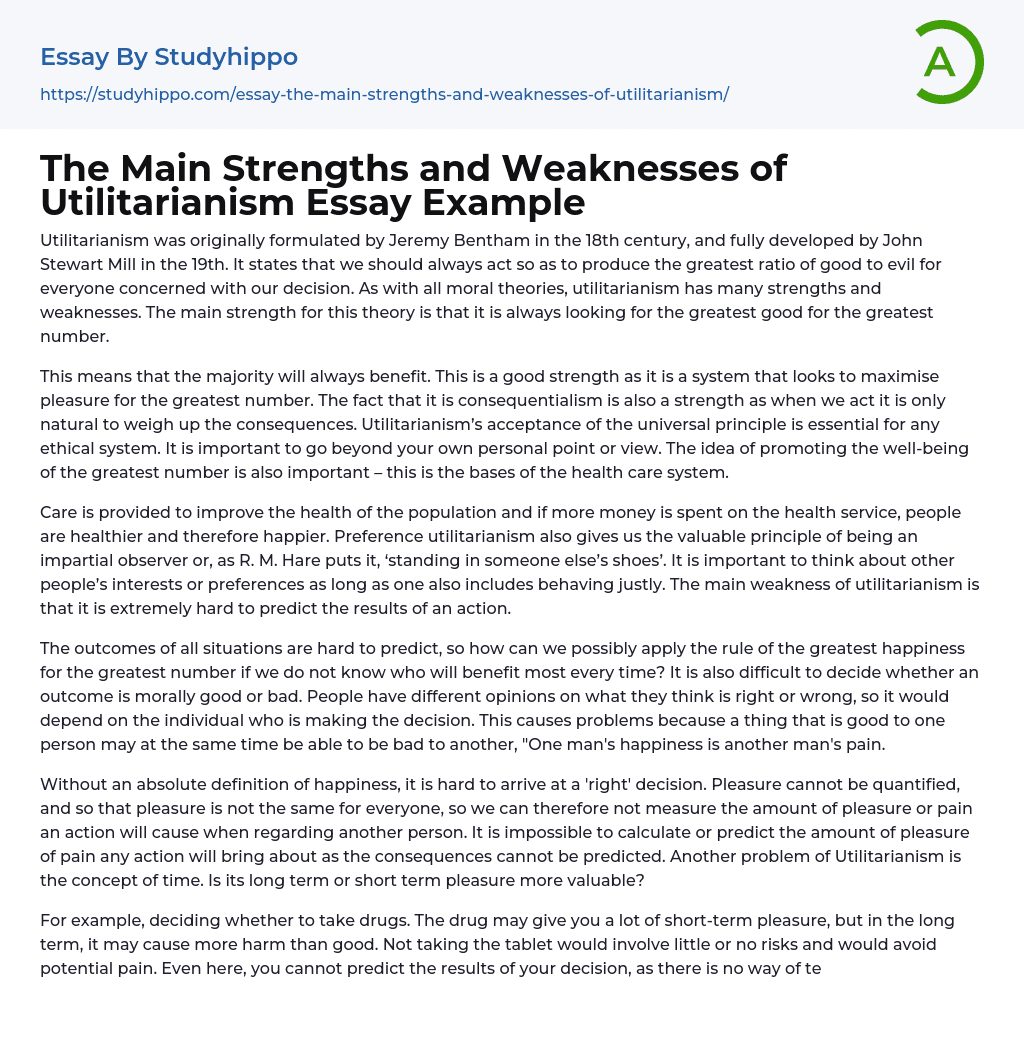

The Main Strengths and Weaknesses of Utilitarianism Essay Example
Utilitarianism was originally formulated by Jeremy Bentham in the 18th century, and fully developed by John Stewart Mill in the 19th. It states that we should always act so as to produce the greatest ratio of good to evil for everyone concerned with our decision. As with all moral theories, utilitarianism has many strengths and weaknesses. The main strength for this theory is that it is always looking for the greatest good for the greatest number.
This means that the majority will always benefit. This is a good strength as it is a system that looks to maximise pleasure for the greatest number. The fact that it is consequentialism is also a strength as when we act it is only natural to weigh up the consequences. Utilitarianism’s acceptance of the universal principle is essential for an
...y ethical system. It is important to go beyond your own personal point or view. The idea of promoting the well-being of the greatest number is also important – this is the bases of the health care system.
Care is provided to improve the health of the population and if more money is spent on the health service, people are healthier and therefore happier. Preference utilitarianism also gives us the valuable principle of being an impartial observer or, as R. M. Hare puts it, ‘standing in someone else’s shoes’. It is important to think about other people’s interests or preferences as long as one also includes behaving justly. The main weakness of utilitarianism is that it is extremely hard to predict the results of an action.
The outcomes of all situations are hard to predict
so how can we possibly apply the rule of the greatest happiness for the greatest number if we do not know who will benefit most every time? It is also difficult to decide whether an outcome is morally good or bad. People have different opinions on what they think is right or wrong, so it would depend on the individual who is making the decision. This causes problems because a thing that is good to one person may at the same time be able to be bad to another, "One man's happiness is another man's pain.
Without an absolute definition of happiness, it is hard to arrive at a 'right' decision. Pleasure cannot be quantified, and so that pleasure is not the same for everyone, so we can therefore not measure the amount of pleasure or pain an action will cause when regarding another person. It is impossible to calculate or predict the amount of pleasure of pain any action will bring about as the consequences cannot be predicted. Another problem of Utilitarianism is the concept of time. Is its long term or short term pleasure more valuable?
For example, deciding whether to take drugs. The drug may give you a lot of short-term pleasure, but in the long term, it may cause more harm than good. Not taking the tablet would involve little or no risks and would avoid potential pain. Even here, you cannot predict the results of your decision, as there is no way of telling the effect the drug has on you until you have tried it. Not only is it hard to tell what will be the consequences
in the long run, but also if indeed this person will receive any harm from it.
- Values of Life essays
- Ethical dilemma essays
- Normative Ethics essays
- Virtue Ethics essays
- Belief essays
- Deontology essays
- Moral essays
- Virtue essays
- Work Ethic essays
- Acceptance essays
- Age Of Enlightenment essays
- Child Observation essays
- Confucianism essays
- Conscience essays
- Critical Reflection essays
- Destiny essays
- Determinism essays
- Empiricism essays
- Environmentalism essays
- Epistemology essays
- Ethics essays
- Ethos essays
- Existence essays
- Existentialism essays
- Fate essays
- Free Will essays
- Functionalism essays
- Future essays
- Good And Evil essays
- Human Nature essays
- Individualism essays
- Meaning Of Life essays
- Metaphysics essays
- Natural Law essays
- Personal Philosophy essays
- Philosophers essays
- Philosophy Of Life essays
- Political Philosophy essays
- Pragmatism essays
- Reality essays
- Relativism essays
- Teaching Philosophy essays
- Time essays
- Transcendentalism essays
- Truth essays
- Utilitarianism essays
- Attitude essays
- Goals essays
- Personal Goals essays
- Personal Life essays



